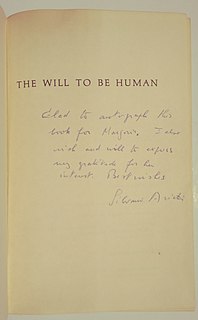A Quote by Bertrand Russell
Scientific societies are as yet in their infancy. It is to be expected that advances in physiology and psychology will give governments much more control over individual mentality than they now have even in totalitarian countries. Fitche laid it down that education should aim at destroying free will, so that, after pupils have left school, they shall be incapable, throughout the rest of their lives, of thinking or acting otherwise than as their schoolmasters would have wished.
Quote Topics
Acting
Advances
After
Aim
Control
Countries
Destroying
Down
Education
Even
Expected
Free
Free Will
Give
Governments
Incapable
Individual
Infancy
Laid
Left
Lives
Mentality
More
Much
Now
Otherwise
Over
Physiology
Psychology
Pupils
Rest
School
Scientific
Shall
Should
Societies
Than
Thinking
Throughout
Totalitarian
Will
Wished
Would
Related Quotes
To the distracting occupations belong especially my lecture courses which I am holding this winter for the first time, and which now cost much more of my time than I like. Meanwhile I hope that the second time this expenditure of time will be much less, otherwise I would never be able to reconcile myself to it, even practical (astronomical) work must give far more satisfaction than if one brings up to B a couple more mediocre heads which otherwise would have stopped at A.
With the egoic consciousness having become so dysfunctional, and now having at our disposal all these enormous technologies and scientific advances, if nothing changes the ego will use those things - as it already has been doing - and will amplify the technology that we now have. The scientific advances, to a large extent, will be used in the service of the ego, and they will become more and more destructive.
As the popular trust in science fades - and many sociologists say that's happening today - people will develop a distrust of purely "scientific" psychology. Researchers in the universities haven't picked up on this; they're more interested in genetics and computer models of thinking than ever. But, in general, there is a huge distrust of the scientific establishment now.
The slave will be free. Democracy in America will yet be a glorious reality; and when the top-stone of that temple of freedom which our fathers left unfinished shall be brought forth with shoutings and cries of grace unto it, when our now drooping Liberty lifts up her head and prospers, happy will he be who can say, with John Milton, "Among those who have something more than wished her welfare, I, too, have my charter and freehold of rejoicing to me and my heirs."
[D]ecade after decade, through taxes and regulations, governments at all levels took ever-increasing control over people's lives, wealth, and property. The control grew exponentially, decade after decade. The rationale was that the control was necessary -- for society, for the poor, for the nation, even for freedom itself. Americans continued living their life of the lie: they continued believing that the more control government exercised over their lives and property, the freer they became.
Of course each citizen should try to educate him or herself, but only after receiving some essential, basic blocks of knowledge. Formal education should always be free; from kindergarten to PhD. It is free in many European countries, and in several Latin American ones (including Cuba, Mexico and Argentina). China is returning to free education, as it is returning to universal health care. In countries like Chile, people are on the streets right now fighting for free education, and they are winning!
If, then, the control of the people over the organs of their government be the measure of its republicanism, and I confess I know no other measure, it must be agreed that our governments have much less of republicanism than ought to have been expected; in other words, that the people have less regular control over their agents, than their rights and their interests require.
Creativity is not simply originality and unlimited freedom. There is much more to it than that. Creativity also imposes restrictions. While it uses methods other than those of ordinary thinking, it must not be in disagreement with ordinary thinking-or rather, it must be something that, sooner or later, ordinary thinking will understand, accept, and appreciate. Otherwise the result would be bizarre, not creative.
Until the Left took over American public education in the second half of the 20th century, it was generally excellent - look at the high level of eighth-grade exams from early in the 20th century and you will weep. The more money the Left has gotten for education - America now spends more per student than any country in the world - the worse the academic results. And the Left has removed God and dress codes from schools - with socially disastrous results.



































